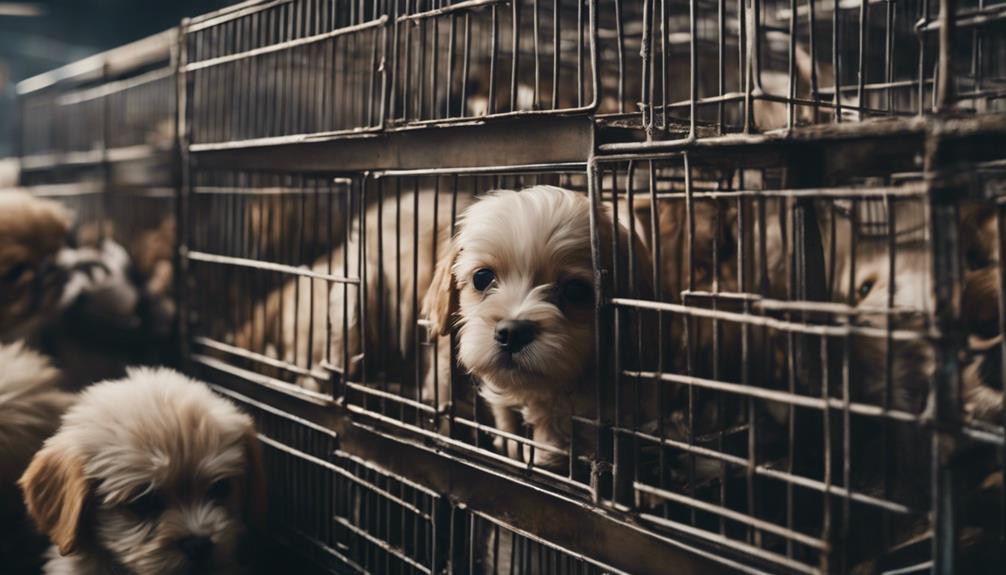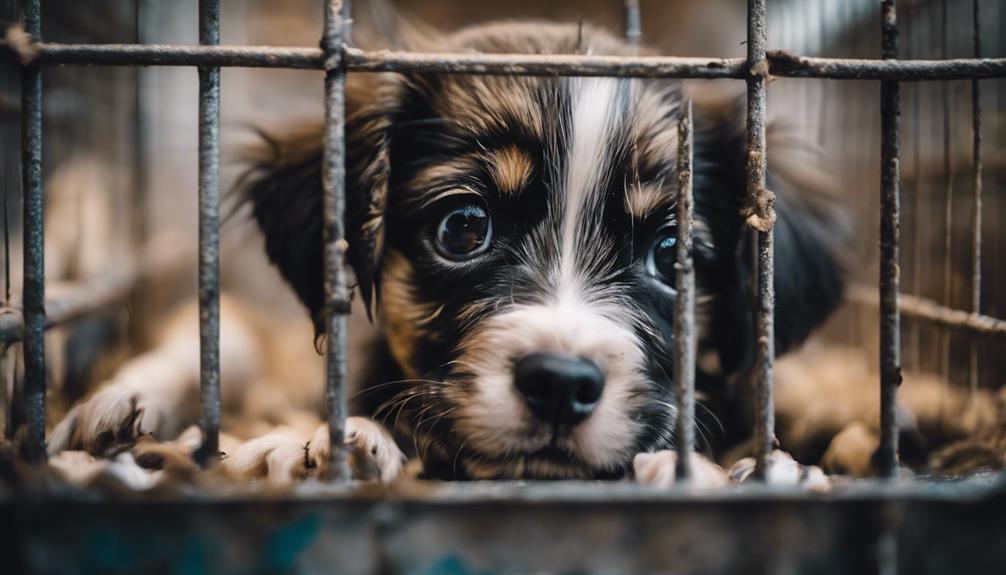
Within the pet industry, the obscured reality of puppy mills and the facade maintained by pet shops and fake breeders raise critical concerns. The need for discernment when acquiring pets goes beyond a mere transaction, delving into ethical considerations and the well-being of animals.
By unraveling the complexities of this issue, a deeper understanding of the implications emerges, prompting a call to action for consumers and advocates alike. The intricate web of factors contributing to this dilemma demands a closer examination, shedding light on an industry marred by exploitation and deception.
Key Takeaways
- Puppy mills supply pet shops with poorly bred dogs.
- Fake breeders deceive buyers with misleading appearances.
- Lack of strict laws enables the continuation of puppy mills.
- Supporting shelters over pet shops combats inhumane practices.
Puppy Mill Operations
Puppy mills, often characterized by their profit-driven operations and substandard living conditions for breeding dogs, represent a dark reality within the pet industry. These operations focus on maximizing profits through unethical practices such as keeping dogs in small, dirty living spaces with no human interaction. Dogs are subjected to nonstop breeding and quick separation from their puppies, leading to physical and psychological issues.
The lack of veterinary care and unsafe transport further exacerbate their suffering. To sell their puppies, puppy mills often use pet stores, fake breeder websites, online classifieds, and pop-up stands, deceiving unsuspecting buyers. This exploitative cycle perpetuates animal cruelty and highlights the urgent need for stricter regulations in the breeding industry.
Scams and Risks
Amid the troubling landscape of puppy mills and their exploitative practices, it is crucial to shed light on the prevalent scams and risks associated with purchasing dogs from these unethical sources. Potential buyers face various dangers when dealing with puppy mills, including falling victim to scams and encountering risks to their financial and emotional well-being. Here is a table outlining some key aspects of scams and risks related to puppy mills:
| Scams and Risks | Details |
|---|---|
| Buyer Beware | Caution needed due to fraudulent practices |
| Puppy mill scams reported in 2021 | Increase in reported scams during the year |
| Likelihood of fake puppy ads | High probability of encountering fake advertisements |
| Average financial loss per scam | Significant monetary losses experienced by victims |
Regulatory Issues

Regulatory oversight in the commercial dog breeding industry often falls short of ensuring adequate animal welfare standards. Despite the Animal Welfare Act (AWA) regulating commercial dog breeding, the minimum standards of care are often just enough for survival, leaving room for improvement.
Some key regulatory issues include:
- Lack of Strict Laws
- Breeders Need to be Licensed and Inspected by USDA
- Rules Are Not Always Enforced
- Pet Stores Still Buy from Unlicensed Breeders
These challenges highlight the need for more stringent regulations and consistent enforcement to ensure the well-being of dogs in commercial breeding facilities. Efforts to address these issues are crucial in combating the unethical practices prevalent in the industry.
Advocacy Efforts
Efforts to promote higher care standards in commercial dog breeding facilities are essential to ensure the welfare of animals in the industry. Advocacy plays a crucial role in raising awareness about the unethical practices of puppy mills. Individuals can advocate for improved regulations, support shelters by adopting pets instead of buying from pet shops, and educate others on the realities of puppy mills. By emphasizing the importance of rescuing animals and contacting legislators to enforce the Animal Welfare Act, advocates can drive positive change.
Spreading awareness is key to eliminating puppy mills, as public support is essential for legislative action. Collaborative efforts between advocates and lawmakers can lead to the establishment of stricter regulations, creating a more humane environment for animals.
Impact of Purchasing From Mills

Advocacy efforts to promote higher care standards in commercial dog breeding facilities are crucial to ensuring the welfare of animals; however, the impact of purchasing puppies from mills perpetuates a cycle of cruelty that funds and sustains inhumane practices.
Buying from puppy mills has far-reaching consequences, including:
- Contribution to Animal Suffering: Each purchase supports the mistreatment and neglect of breeding dogs.
- Financial Backing for Inhumane Practices: Funds from sales enable mills to continue their operation without repercussions.
- Health Risks to Animals: Puppies from mills often face health issues due to poor breeding practices and lack of veterinary care.
- Undermining Adoption Solutions: Choosing mills over shelters perpetuates the problem rather than supporting humane alternatives.
Adoption From Shelters
Choosing to adopt from shelters provides a compassionate and responsible alternative to supporting the unethical practices of puppy mills. When you adopt from a shelter, you are giving a second chance to an animal in need and providing them with a loving home. Not only does adoption save a life, but it also helps reduce the demand for puppies from mills, ultimately contributing to the fight against inhumane breeding practices. By choosing adoption, you are making a positive impact and promoting animal welfare.
| Benefits of Shelter Adoption | Emotions Evoked | Impact |
|---|---|---|
| Saves a life | Compassion | Reduces demand for puppy mill puppies |
| Provides a loving home | Responsibility | Contributes to fighting against inhumane breeding practices |
| Promotes animal welfare | Hope | Positive impact on the lives of shelter animals |
Legislative Action

Legislative action plays a crucial role in enforcing stricter regulations and holding breeders accountable for following guidelines to ensure the welfare of animals in commercial dog breeding operations. It is essential to have laws that protect animals and prevent exploitation.
Some key points regarding legislative action include:
- Strengthening state laws with public support
- Making AWA enforcement a legislative priority
- Implementing consequences for breeders not following guidelines
- Advocacy leading to the establishment of stricter regulations
These actions are crucial in creating a more humane environment for animals and combating the inhumane practices often found in puppy mills. By advocating for and enforcing these regulations, we can work towards a future where animals are treated with the care and respect they deserve.
Collaboration for Change
Effective collaboration among stakeholders is essential in fostering meaningful change within the commercial dog breeding industry, promoting animal welfare and ethical practices. By working together, stakeholders such as animal welfare organizations, legislators, and consumers can address the systemic issues that perpetuate puppy mills and fake breeders. This collaborative effort can lead to the implementation of stricter regulations, increased enforcement of existing laws, and a shift towards supporting reputable breeders and adoption from shelters.
| Stakeholders | Role | Contribution |
|---|---|---|
| Animal Welfare Organizations | Advocate for higher care standards | Raise awareness about inhumane breeding practices |
| Legislators | Prioritize AWA enforcement | Strengthen laws and impose consequences for non-compliance |
| Consumers | Choose adoption from shelters over pet shops | Drive demand for ethical breeding practices |
What Role Do Puppy Mills and Fake Breeders Play in the Teacup Dog Industry?
Puppy mills and fake breeders often supply teacup dogs to meet the increasing demand for these tiny breeds. However, these unethical practices often result in health issues for the dogs, leading to increased veterinarian advice for owners. It’s important to educate consumers about the dangers of supporting these industries.
Conclusion
In conclusion, the inhumane practices of puppy mills highlight the need for stricter regulations and increased advocacy efforts to combat the exploitation of animals for profit.
By supporting shelters, adopting pets, and advocating for legislative action, individuals can contribute to creating a more compassionate environment for animals and promoting responsible pet ownership.
Collaboration among stakeholders is essential in addressing the challenges posed by puppy mills and working towards a future where animals are treated with dignity and care.




